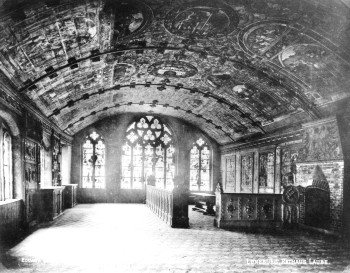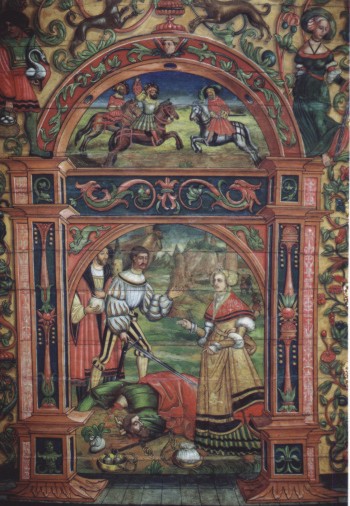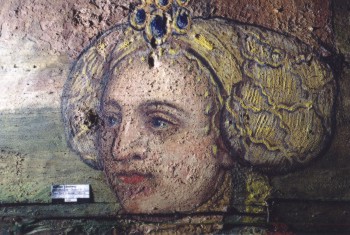Hochschularbeit
| Kirsten Schröder: | The paintings on the wooden ceiling of the Gerichtslaube in Lüneburg Town Hall. Examination and a concept for further conservation treatments. | Zurück |
| Sprache: | Original - Übersetzung | |
| Seitenübersicht: |
|
|
 Gerichtslaube, view southwards (photograph Eduard Lühr, Lüneburg 1895).
|
|
 Ceiling 4th section east, photo of the entire scenery, assassination to the violent guard by the friends of Orgisgontis' wife.
|
|
| Zusammenfassung: | Today’s appearance of the 16thcentury paintings on the wooden ceiling in the Gerichtslaube of the Lüneburg Town Hall is caused by the extensive conservation treatments of the 19thcentury. In addition to the restoration of roof and ceiling alterations the report deals with the origin and the conservation history of the most valuable and, in Lower Saxony, unique paintings. Prerequisite for the protection of the present condition is finding appropriate treatments. The concept for further treatments is based on a comprehensive condition description and extensive conservation and natural science examinations of the original painting, the overpaintings of 1878-82 and the conservation treatments in 1963-65. |
| Schlagworte: | Lüneburg Town Hall, Gerichtslaube, wooden ceiling, ceiling painting, conservation, restoration, 19thcentury, Roman History |
 Face of Orgisgontis' wife, strong glancing light, cupping, tenting and spalling paint.
|
|
| weitere Angaben: |
|
| Kontakt: |
Kirsten Schröder Am Taubenfelde 3 30159 Hannover Deutschland schroederkirsten@[Diesen Teil loeschen]gmx.de |
| Zurück | |
Das Hornemann Institut verfügt ausschließlich über die hier angezeigten Informationen. Für weitere Informationen oder Kopien der Hochschularbeit wenden Sie sich bitte an den Autor/die Autorin - oder wenn kein Kontakt angegeben ist - an die Sekretariate der jeweiligen Fakultäten.